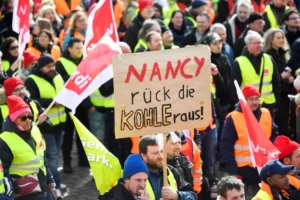While Europe’s largest economy struggles under inflation, which hit 9.3 percent in February, Germany’s transportation workers are conducting one of the largest walkouts in recent memory.
In its search for alternative energy sources, Germany, which was predominately dependent on Russia for gas before the conflict in Ukraine, has been particularly severely struck by price increases. In recent months, its inflation rates have been higher than the average for the euro-area.
Germany’s airports, bus terminals, and train stations were all shut down on Monday due to 24-hour strikes called by the Verdi trade union and the EVG railway and transport union.
When train services were canceled by railroad operator Deutsche Bahn, terminals were practically vacant as airports, including two of Germany’s major in Munich and Frankfurt, ceased flights.
Workers on strike blew horns and whistles, held up placards, and waved flags while protesting while donning yellow or red high-visibility jackets.
Despite a few lines being available, the strikes forced millions of people in Germany to get used to a day without regular transportation.
According to the Airports Association, 380,000 travelers were impacted. Over 1,200 planes in Frankfurt alone were canceled, stranding 160,000 passengers who slept on benches. The shortage of city trains in Cologne caused a rush for cabs.
Central banks have raised interest rates repeatedly as a result of ongoing cost constraints. According to policymakers, it is too early to discuss a price-wage spiral.
While EVG is negotiating on behalf of roughly 230,000 workers at Deutsche Bahn and bus firms, Verdi is doing so on behalf of about 2.5 million public sector employees, including those who work in public transportation and airports.
Both sides dug in their heels in the hours leading up to the strikes, with union bosses stating that large pay increases were a “matter of survival” for thousands of workers.
The strikes were described as “extreme” and “exaggerated” by a Deutsche Bahn spokesperson.
While EVG is requesting a wage increase of 12 percent, or at least 650 euros ($700) more per month, Verdi is calling for a raise of 10.5%, which would increase pay by at least 500 euros ($538) per month.
Passengers who were stranded expressed their sympathies and displeasure regarding the strikes.
Lars Boehm, a passenger, stated, “Sure, it’s justified, but I for one never went on strike in my entire life, and I’ve been working for more than 40 years.” “At the same time, there are ongoing strikes in France on various issues.”
Steep pay rises will limit the Chancellor Olaf Scholz government’s financial flexibility, complicating already contentious budget negotiations within his three-party coalition.
Businesses are cautioning that raising salaries for transportation workers will necessitate raising prices and taxes to cover the shortfall.
On Monday, a government official advised against bringing up politics during the wage negotiations.
Martin Burkert, the chairman of EVG, issued a warning that additional strikes could occur, even over the Easter break.
Christoph Gerschner, a striking worker, stated, “We have been dragged along here for too long. “The wealthy reap the rewards, while the working class, who keep things going, receive nothing. To make ends meet, some work a second or third job.
The German central bank, according to a reporter from Berlin, has adopted a “more autonomous viewpoint,” which permits unions to make reasonable claims while maintaining that enterprises must generate reasonable profits.

The worst street violence in France in years has been provoked by protests over President Emmanuel Macron’s pension plans.




